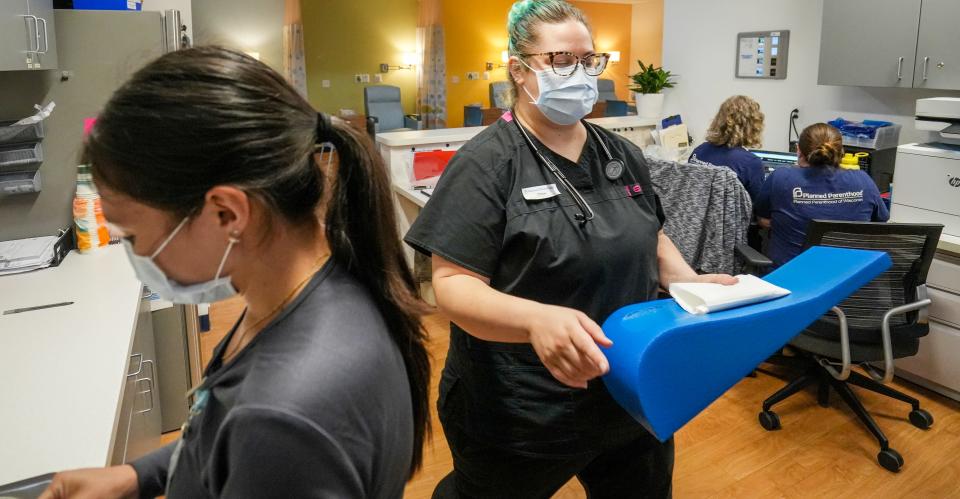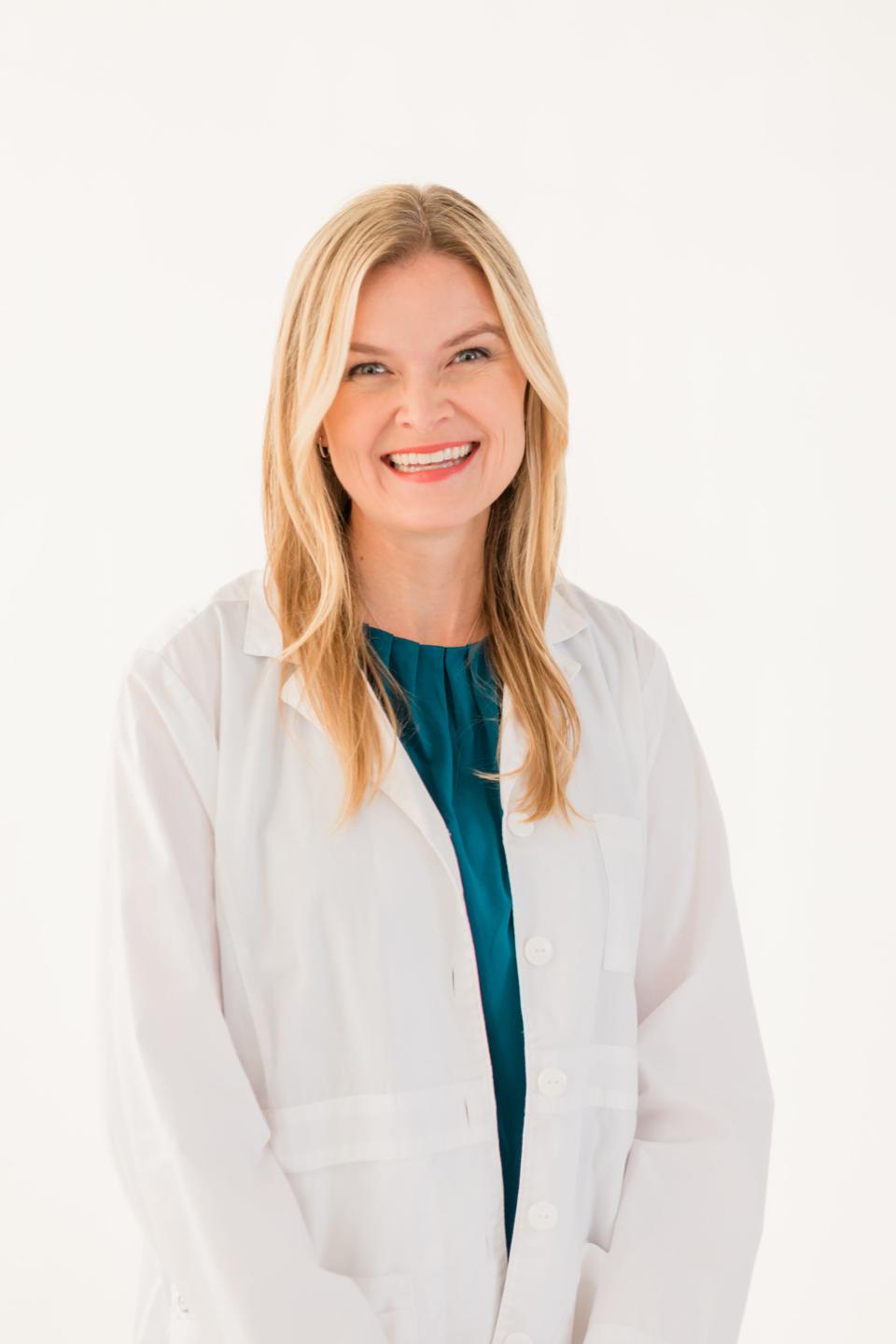Planned Parenthood doctor relieved to be providing full range of services to patients again
For more than year, Dr. Allie Linton could not provide the full spectrum of reproductive health care to her patients in Wisconsin.
Needless to say, she did not like it.
On Monday, that changed.
Linton, Planned Parenthood of Wisconsin's associate medical director, again met with patients seeking an abortion.
For her, it was a sense of relief after a year of professional frustration.
"I have been feeling very thankful that we can return to this level of care," Linton told the Milwaukee Journal Sentinel prior to seeing patients Monday. "It sounds cliche to say, but abortion is health care. And to be able to have patients access to health care in their state again is incredibly important."

It is estimated that more than 7,080 fewer abortions were performed in Wisconsin in the year following the overturning of Roe v. Wade, according to #WeCount, a project of The Society of Family Planning, a nonprofit that advocates for abortion and contraception care informed by science.
That ended Monday with Planned Parenthood again providing the procedure in two clinics, one in Milwaukee and one in Madison. Its Sheboygan clinic again will provide the procedure when staffing levels are met.
While it is not possible to determine how many patients were unable to travel to another state to obtain care, it is clear many traveled south to Illinois, where abortions are legal until fetal viability, or around 24-26 weeks of pregnancy.
“We are thrilled Wisconsin patients have a choice and are not forced to flee their state for health care and clinicians can provide care in their home state," Jennifer Welch, president and CEO of Planned Parenthood of Illinois said in a statement Monday.
Given Wisconsin's still limited availability, she acknowledged her state may still be an option. "We are proud to serve patients from Wisconsin and look forward to continuing our partnership in a meaningful way."
That partnership began a month after the Dobbs v. Jackson Women's Health Organization decision overturned Roe v Wade. Planned Parenthood of Wisconsin and Planned Parenthood of Illinois agreed to expand capacity at the Waukegan Health Center and other Planned Parenthood locations in Illinois by allowing abortion care providers from Planned Parenthood of Wisconsin to travel and work at the clinics several times a week.
Linton was one of those providers making the trip.
The two state Planned Parenthood organizations also quadrupled the number of abortion patient navigators and expanded abortion services at its Champaign, Illinois, location.
Planned Parenthood of Wisconsin's decision to resume providing abortion care was announced Thursday.
The decision follows Dane County Circuit Judge Diane Schlipper's July denial of a motion to dismiss a lawsuit filed by Attorney General Josh Kaul.
The lawsuit argues a state abortion ban passed in 1849, which had effectively returned after the Dobbs decision, was unenforceble.
In denying the motion, Schlipper wrote: "There is no such thing as an '1849 Abortion Ban' in Wisconsin. A physician who performs a consensual medical abortion commits a crime only 'after the fetus or unborn child reaches viability …'" Schlipper added that the law doesn't prohibit consensual medical abortions, meaning abortions voluntarily sought out by the pregnant person.
Schlipper is expected to rule on the entirety of Kaul's case soon.
Linton said the resumption of care puts the power of choice back with women and their families and removes the "confusion" that has surrounded care for the past 450-plus days.

For example, doctors sometimes see signs during an exam that a miscarriage is likely to occur (or impending). When this happens, doctors like Linton sometimes have to wait up to two weeks to perform another ultrasound to confirm the diagnosis and offer treatment.
Before Monday, the patient could not talk with the doctor about ending the pregnancy. Now, they can talk with the doctor about waiting for a confirmatory diagnosis or proceeding with treatment of a likely miscarriage after 24 hours.
“That’s their choice now,” Linton said.
In addition, decisions can be made sooner in the pregnancy. In 2021, nearly 60% of the 6,472 abortions received by Wisconsin residents were performed during the first eight weeks of pregnancy, according to the Wisconsin Department of Health Services.
In the year following the Dobbs decision, patients requesting abortions who were more than 16 weeks pregnant increased from 8% to 13% in Illinois, according to Planned Parenthood of Illinois. This suggests that women, likely from out of state, were taking longer to reach a clinic than pre-Dobbs.
The number of patients needing financial assistance or travel support to get care at Planned Parenthood of Illinois has more than doubled in the year since Dobbs, according to the health care provider.
Planned Parenthood will operate under the state's pre-Dobbs abortion laws, under which abortion is banned 20 weeks after "probable fertilization." Women are required to undergo an ultrasound before an abortion, along with a counseling appointment and a 24-hour waiting period. In the case of medication abortions, the doctor who administers the pills must be the same one the woman saw for her counseling appointment, and the pills cannot be taken remotely via telemedicine.
Linton said those restrictions to the medical procedure created too many barriers for too many people.
"I am so thankful we are resuming abortion services today and hope this is a starting point" Linton said. "We still have a long way to go in order to continue to increase access and to make sure all patients in the state can access an abortion as routine health care."
Jessica Van Egeren is Milwaukee Journal Sentinel's enterprise health reporter. She can be reached at jvangeren@gannett.com.
This article originally appeared on Milwaukee Journal Sentinel: Planned Parenthood of Wisconsin thankful to offer abortions again

